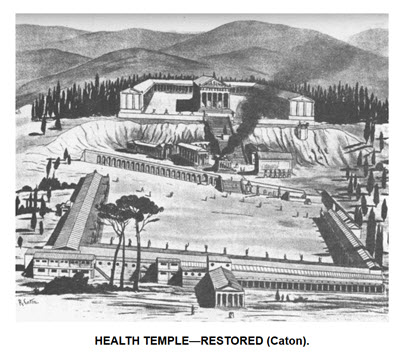OUTLINES OF GREEK AND ROMAN MEDICINE
 I was stimulated to write these Outlines of Greek and Roman Medicine by
a recent sojourn in the south-eastern part of Europe. The name of the
book defines, to some extent, its limitations, for my desire has been to
give merely a general outline of the most important stages in the
advancement of the healing art in the two Empires to which modern
civilization is most deeply indebted. There are a few great works on the
history of medicine by continental writers, such, for instance, as those
by the German writers, Baas, Sprengel, and Puschmann, but, generally
speaking, the subject has been much neglected.
I was stimulated to write these Outlines of Greek and Roman Medicine by
a recent sojourn in the south-eastern part of Europe. The name of the
book defines, to some extent, its limitations, for my desire has been to
give merely a general outline of the most important stages in the
advancement of the healing art in the two Empires to which modern
civilization is most deeply indebted. There are a few great works on the
history of medicine by continental writers, such, for instance, as those
by the German writers, Baas, Sprengel, and Puschmann, but, generally
speaking, the subject has been much neglected.
I cherish the hope that this little work may appeal to doctors, to
medical students, and to those of the public who are interested in a
narration of the progress of knowledge, and who realize that the
investigation of the body in health and disease has been one of the most
important features of human endeavour.
The medical profession deserves censure for neglect of its own history,
and pity 'tis that so many practitioners know nothing of the story of
their art. For this reason many reputed discoveries are only
re-discoveries; as Bacon wrote: "Medicine is a science which hath been,
as we have said, more professed than laboured, and yet more laboured
than advanced; the labour having been, in my judgment, rather in circle
than in progression. For I find much iteration, and small progression."
Of late years, however, the History of Medicine has been coming into its
kingdom. Universities are establishing courses of lectures on the
subject, and the Royal Society of Medicine recently instituted a
historical section.
The material I have used in this book has been gathered from many
sources, and, as far as possible, references have been given, but I have
sought for, and taken, information wherever it could best be found. As
Montaigne wrote: "I have here only made a nosegay of culled flowers, and
have brought nothing of my own but the thread that ties them together."
I have to express my indebtedness to my friend, Mr. J. Scott Riddell,
Senior Surgeon, Aberdeen Royal Infirmary, for
his great kindness in reading the proof-sheets, preparing the index and
seeing this book through the press and so removing one of the
difficulties which an author writing overseas has to encounter; also to
my publishers for their courtesy and attention.
Table of Contents
Prev
| Next
| Contents
 I was stimulated to write these Outlines of Greek and Roman Medicine by
a recent sojourn in the south-eastern part of Europe. The name of the
book defines, to some extent, its limitations, for my desire has been to
give merely a general outline of the most important stages in the
advancement of the healing art in the two Empires to which modern
civilization is most deeply indebted. There are a few great works on the
history of medicine by continental writers, such, for instance, as those
by the German writers, Baas, Sprengel, and Puschmann, but, generally
speaking, the subject has been much neglected.
I was stimulated to write these Outlines of Greek and Roman Medicine by
a recent sojourn in the south-eastern part of Europe. The name of the
book defines, to some extent, its limitations, for my desire has been to
give merely a general outline of the most important stages in the
advancement of the healing art in the two Empires to which modern
civilization is most deeply indebted. There are a few great works on the
history of medicine by continental writers, such, for instance, as those
by the German writers, Baas, Sprengel, and Puschmann, but, generally
speaking, the subject has been much neglected.